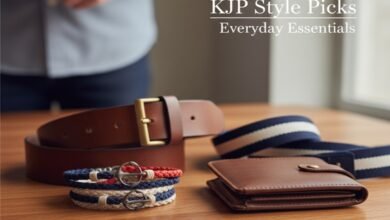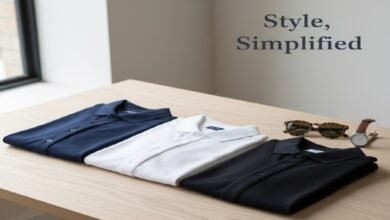The Best Clothing Brands: Style, Quality, and Sustainability
In today’s fashion landscape, the choices are endless. From high-end luxury labels to sustainable brands, the variety of clothing available caters to diverse tastes and preferences. This blog will explore some of the best clothing brands, focusing on their unique offerings, quality, and commitment to sustainability.
1. Nike
When it comes to athletic wear, Nike stands at the forefront. Founded in 1964, the brand has become synonymous with quality sports apparel and footwear. Nike’s innovative technologies, such as Dri-FIT, enhance performance, making them a favorite among athletes and casual wearers alike.
In recent years, Nike has made strides toward sustainability by launching the “Move to Zero” initiative, which aims to reduce waste and carbon emissions. The brand uses recycled materials in many of its products, helping consumers feel good about their purchase choices.
2. Levi’s
Levi’s is an iconic brand known for its denim, particularly the classic 501 jeans. Established in 1853, Levi’s has built a legacy around quality craftsmanship and timeless style. The brand is often credited with revolutionizing the way people wear jeans, making them a staple in wardrobes worldwide.
Levi’s is also committed to sustainability. The “Water<Less” initiative has significantly reduced the water used in the finishing process of jeans. Moreover, the brand encourages customers to recycle their old denim through its in-store programs, emphasizing a circular economy approach.
3. Patagonia
For those who prioritize environmental responsibility, Patagonia is a standout choice. Founded in 1973, this outdoor clothing brand is known for its high-quality, functional gear designed for adventure enthusiasts. From jackets to hiking pants, Patagonia’s products are built to last, reducing the need for frequent replacements.
Patagonia is deeply committed to sustainability and activism. The brand pledges 1% of its sales to environmental organizations and uses recycled materials in many of its products. Their “Worn Wear” program promotes repairing and recycling clothing, encouraging customers to extend the life of their gear.
4. Everlane
Everlane has redefined modern basics with a focus on transparency and ethical production. Founded in 2010, the brand offers a wide range of clothing, from everyday essentials to stylish office wear. Everlane is known for its minimalist aesthetic and high-quality materials, making their pieces versatile and timeless.
The brand stands out for its commitment to ethical practices. Everlane provides customers with a “Transparent Pricing” model, breaking down the cost of each item and how much goes to production, labor, and profit. This transparency fosters trust and encourages informed purchasing decisions.
5. Uniqlo
Japanese retailer Uniqlo is known for its affordable, high-quality basics. Established in 1984, the brand focuses on functional clothing that incorporates innovative technologies, such as HeatTech for warmth and AIRism for breathability. Uniqlo’s pieces are designed to be versatile, making them ideal for layering and everyday wear.
Uniqlo is also committed to sustainability. The brand has introduced a recycling program where customers can donate unwanted clothing, ensuring it gets reused or recycled. Additionally, Uniqlo’s “LifeWear” philosophy emphasizes creating clothing that meets the needs of everyday life, combining comfort with style.
6. Alo Yoga
Alo Yoga has made a name for itself in the athleisure market, offering stylish yoga wear and activewear that seamlessly transitions from studio to street. Founded in 2007, the brand focuses on creating high-quality, functional pieces that enhance performance and comfort.
Alo Yoga is dedicated to sustainability, using eco-friendly materials in many of its products. The brand also champions mindfulness and wellness, actively promoting yoga and meditation through its community initiatives. This commitment resonates with consumers looking for more than just clothing—they want a lifestyle.
7. H&M Conscious
H&M is a fast-fashion giant that has made efforts to embrace sustainability through its H&M Conscious line. This collection features clothing made from organic or recycled materials, providing fashionable options for eco-conscious consumers. H&M’s commitment to sustainability includes goals to use only recycled or sustainable materials by 2030.
The brand also offers a garment recycling program, encouraging customers to return unwanted clothing. While fast fashion has its criticisms, H&M’s efforts to incorporate sustainable practices make it a noteworthy player in the industry.
8. Rag & Bone
Rag & Bone blends British heritage with modern American style. Established in 2002, the brand is known for its high-quality denim and chic casual wear. Rag & Bone combines traditional tailoring with an edgy aesthetic, appealing to fashion-forward individuals.
Sustainability is a priority for Rag & Bone, as the brand focuses on responsible sourcing and production. They utilize sustainable practices in their manufacturing processes and aim to create long-lasting, timeless pieces that stand the test of time.
9. Reformation
Reformation is a standout brand in the sustainable fashion space. Founded in 2009, the brand offers trendy clothing made from eco-friendly materials, such as TENCEL and recycled fabrics. Reformation is celebrated for its stylish dresses, tops, and activewear that appeal to a younger audience.
Transparency is a key element of Reformation’s ethos. The brand provides detailed information about the environmental impact of each piece, helping consumers make informed choices. Their commitment to sustainability and stylish designs has garnered a loyal following.
10. Allbirds
While primarily known for its footwear, Allbirds has expanded into clothing, emphasizing comfort and sustainability. Founded in 2014, Allbirds uses natural materials like merino wool and eucalyptus tree fibers to create soft, breathable pieces. The brand’s focus on minimizing its carbon footprint resonates with eco-conscious consumers.
Allbirds takes pride in transparency, offering customers insights into their supply chain and production processes. Their commitment to sustainability and innovative materials has made them a favorite among those looking for comfortable and environmentally friendly clothing.
Conclusion
The best clothing brands today are those that prioritize quality, style, and sustainability. Whether you’re looking for activewear, everyday basics, or fashionable statement pieces, these brands offer a variety of options that cater to different tastes while promoting responsible practices. As consumers become more aware of the impact of their purchasing decisions, supporting brands that align with values of sustainability and ethical production is more important than ever. By choosing these brands, you not only enhance your wardrobe but also contribute to a more sustainable fashion industry.




